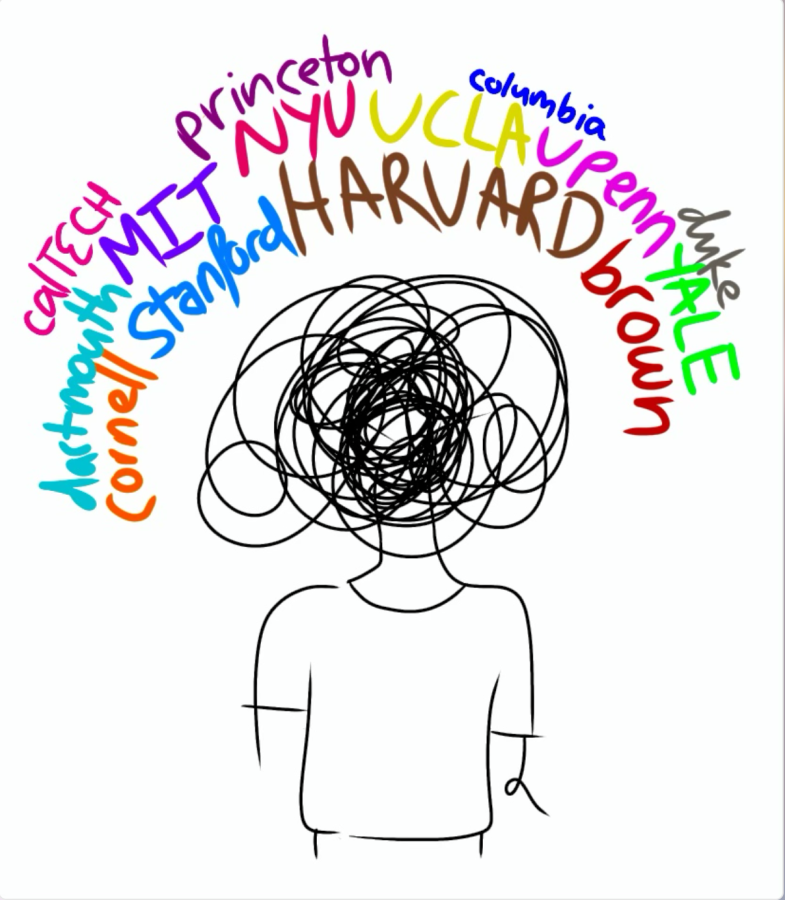Do students chose colleges based on brand names?
Acceptance rates of Ivy League and highly ranked schools in America are at an all time low. For the highschool class of 2022, Harvard, Yale and Brown have all reported record low acceptance rates, partially due to the fact that they’ve encouraged more students to apply. A 2022 Common Application report revealed a 21 percent increase in applications comparing 2019-2020 and 2021-2022 years (this data was pooled from 853 member schools). These decreasing acceptance rates are often seen as an indicator of institutional prestige, which in turn have shaped perceptions of institutional quality.
Urban College Counselor Andy Schine said online accessible applications contribute to this number. “The Common Application and the digital application process, generally speaking, has made it much easier to apply to multiple colleges,” said Schine. “Back when I was applying to college, you did the entire process by hand. Maybe you had an electric typewriter or a word processor, most likely you wrote your essay by hand and you most certainly mailed it in by USPS… it was a real process.”
Another reason for the increase in applications is the test-optional policy many colleges have implemented during COVID-19. “Students who normally would self-select out of the admissions pool — they would look at the average SAT score and not apply — those kids are applying,” said Michelle McAnaney, president of the college counseling company The College Spy, in an interview with CBS News.
This year, Columbia University dropped from No. 2 to No. 18 in the U.S. News rankings. U.S. News annually ranks universities based on set criteria like reputation and student selectivity. Following Columbia’s rank drop, many have questioned whether colleges can actually be ranked by a single number, as well the value of institutional prestige.
“A ‘brand name’ college doesn’t necessarily measure the academic promise or quality of an institution,” said Schine. Nonetheless, she understands college brand names are often idealized. “Brand name colleges are just that- out on a pedestal. Same with brand name clothing, handbags, shoes. College is no different. It’s a familiar phenomena and mainly driven by the advertising world.”
“[Brand names] definitely influence what other people think about a college,” Joselyn Xa-Chin ‘23 said, “Not everyone’s gonna know every single thing… but they will notice how often they’ve heard the name or what they think of it.” Xa-Chin has seen the effect of perceived college prestige on some of her peers and where they choose to apply. “If you have heard of the name, they will apply. If they have not heard the name they will not apply… [it] comes from their environment because that’s what everyone tells them is good,” Xa-Chin said.
For some students, prestigious schools have less of an impact on their process. “I try to make my application as strong as I possibly can,” Amelia Hayward ‘23 said.” I’ve been sort of able to avoid falling into the trap of ‘It’s a 9 percent acceptance rate I’m not gonna get in.’ I don’t really care about Harvard or Yale.”
Self-inflicted pressure to attend a school with a prestigious reputation drives students to apply to top-ranked schools. “I felt like I had to go to the best school I got into for a long time, and to try and get into the best school possible. In the end, I got into more competitive schools that some people might consider ‘better’ but I chose the one I enjoyed the most,” said alum Tallulah Riccardi ‘20, a junior at UCSC. “Coming from Urban, which was so academically challenging, choosing a school more all around enjoyable was important for me and definitely helped my mental health.”
Alum Rowan Kruger ‘21, a sophomore at UCLA, said, “[brand name colleges] are not necessarily better in terms of the quality of classes or the experience someone will have. I haven’t yet experienced what it’s like to have a brand name school on a resume, but I can’t imagine that it will make a huge difference.” Additionally, she also offers advice to future applicants. “Apply to the schools that you feel are the best match for you, and that often won’t be one with crazy prestige.”
“One of the things I realized is that an Ivy League school, they’re great schools, but they’re not the only schools,” said Amina Samake, the director of counseling services. “There are so many really wonderful schools out there, where you can get an incredible education AND be fully prepared for your future.” ◼












